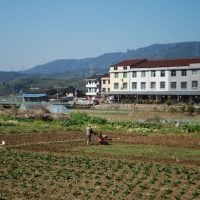Deadline: 18-Apr-2022
The United States Agency for International Development (USAID) is seeking applications for a Cooperative Agreement from qualified entities to implement the USAID Advancing Food Fortification Opportunities to Reinforce Diets (USAID AFFORD) program.
The USAID Advancing Food Fortification Opportunities to Reinforce Diets (USAID AFFORD) activity is designed by the Bureau of Resilience and Food Security (RFS), in collaboration with the Bureau for Global Health and Bureau for Humanitarian Assistance, to provide operational support to field Missions and other Operating Units (OUs) of the U.S. Agency for International Development (USAID), contributing to the goals of the Global Food Security Strategy (GFSS) through the implementation of programming aligned with the Agency’s LSFF Results Framework.
Goals
The successful applicant will prioritize support to Feed the Future (FTF) and nutrition priority countries to improve micronutrient adequacy and diets safely and sustainably for the most economically and nutritionally vulnerable population groups, through the large-scale food fortification (LSFF) of regularly consumed staple foods and condiments (e.g., salt, sugar, oil, rice, and flours).
Funding Information
- The award’s total estimated Amount (TEA) allows a maximum award ceiling of up to 75,000,000 structured as follows:
- A $20,000,000 Leader Award will support USAID’s effort to safely and sustainably reduce micronutrient inadequacies and improve diets, particularly for women and children, through LSFF of staple foods and condiments.
- $55,000,000 of potential funding will be awarded non-competitively by USAID field missions or other offices to support additional activities that fall within the technical scope of the award. This may include:
- A maximum of $35,000,000 in potential Associate Awards
- A maximum of $20,000,000 in potential buy-in
- The anticipated period of performance is five (5) years.
Expected Results
Key expected results include:
- The enabling environment and regulatory monitoring and enforcement of LSFF is strengthened and extended through the public sector.
- LSFF is expanded and sustained by the private sector. Through elimination of market barriers and enhanced incentivization, food processing companies invest in their businesses and gradually build their own capacity to produce fortified foods in compliance with national fortification standards.
- Design, monitoring, and evaluation of fortification programs strengthened, and the public sector and private sectors held accountable to maximize compliance with national standards through civil society, including academic institutions.
- Global commitment, leadership, and resources garnered and mobilized to support LSFF.
Target Countries
- Nutrition Priority Countries: There are 14 nutrition priority countries: Bangladesh, Burkina Faso, Democratic Republic of the Congo (DRC), Ethiopia, Ghana, Malawi, Mali, Mozambique, Nepal, Niger, Nigeria, Senegal, Tanzania, and Uganda. USAID also identified four Nutrition Strategic Support Countries (NSSCs) that did not meet the rigorous needs and opportunity criteria but merit continued prioritization due to critical policy and technical considerations: Guatemala, Haiti, Tajikistan, and Zambia.
- FTF Target Countries: FTF invests in a select set of countries that are committed to improving their own food security and nutrition. Target countries include: Bangladesh, Ethiopia, Ghana, Guatemala, Honduras, Kenya, Mali, Nepal, Niger, Nigeria, Senegal, and Uganda. Feed the Future also coordinates activities and support across a set of aligned countries and at the regional level in Asia, Latin America and the Caribbean, the Middle East, and East, Southern and West Africa to improve food security, resilience, and nutrition.
Eligibility Criteria
- USAID welcomes applications from organizations that have not previously received financial assistance from USAID.
- Faith-based organizations are eligible to apply for federal financial assistance on the same basis as any other organization and are subject to the protections and requirements of Federal law.
For more information, visit https://www.grants.gov/web/grants/view-opportunity.html?oppId=338776









































